八年级上册英语课堂笔记
初二上册英语书笔记
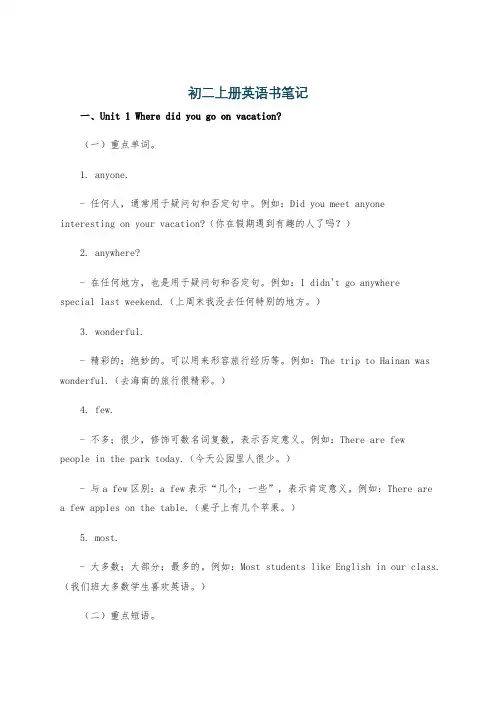
初二上册英语书笔记一、Unit 1 Where did you go on vacation?(一)重点单词。
1. anyone.- 任何人,通常用于疑问句和否定句中。
例如:Did you meet anyone interesting on your vacation?(你在假期遇到有趣的人了吗?)2. anywhere?- 在任何地方,也是用于疑问句和否定句。
例如:I didn't go anywherespecial last weekend.(上周末我没去任何特别的地方。
)3. wonderful.- 精彩的;绝妙的。
可以用来形容旅行经历等。
例如:The trip to Hainan was wonderful.(去海南的旅行很精彩。
)4. few.- 不多;很少,修饰可数名词复数,表示否定意义。
例如:There are few people in the park today.(今天公园里人很少。
)- 与a few区别:a few表示“几个;一些”,表示肯定意义。
例如:There are a few apples on the table.(桌子上有几个苹果。
)5. most.- 大多数;大部分;最多的。
例如:Most students like English in our class.(我们班大多数学生喜欢英语。
)(二)重点短语。
1. go on vacation.- 去度假。
例如:They went on vacation in Paris last year.(他们去年去巴黎度假了。
)2. stay at home.- 待在家里。
例如:I stayed at home and watched TV yesterday.(我昨天待在家里看电视了。
)3. go to the mountains.- 去爬山。
例如:We went to the mountains and had a great time.(我们去爬山了,玩得很开心。
牛津译林版八年级英语上册8AUnit1课堂笔记
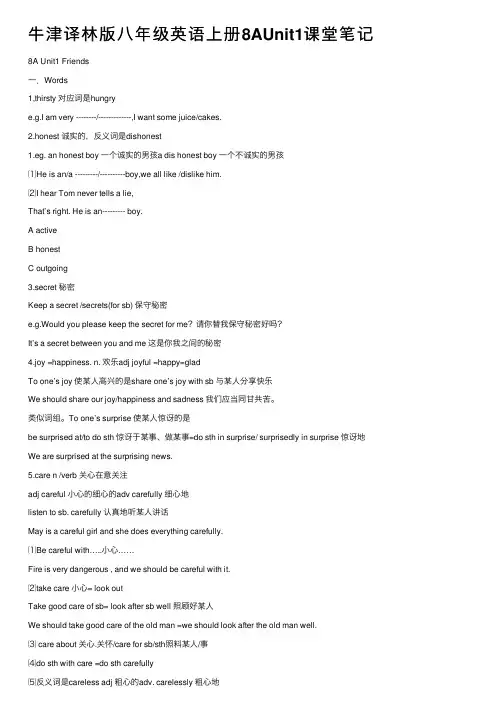
⽜津译林版⼋年级英语上册8AUnit1课堂笔记8A Unit1 Friends⼀.Words1,thirsty 对应词是hungrye.g.I am very --------/-------------,I want some juice/cakes.2.honest 诚实的,反义词是dishonest1.eg. an honest boy ⼀个诚实的男孩a dis honest boy ⼀个不诚实的男孩⑴He is an/a ---------/----------boy,we all like /dislike him.⑵I hear Tom never tells a lie,That’s right. He is an--------- boy.A activeB honestC outgoing3.secret 秘密Keep a secret /secrets(for sb) 保守秘密e.g.Would you please keep the secret for me?请你替我保守秘密好吗?It’s a secret between you and me 这是你我之间的秘密4.joy =happiness. n. 欢乐adj joyful =happy=gladTo one’s joy 使某⼈⾼兴的是share one’s joy with sb 与某⼈分享快乐We should share our joy/happiness and sadness 我们应当同⽢共苦。
类似词组。
To one’s surprise 使某⼈惊讶的是be surprised at/to do sth 惊讶于某事、做某事=do sth in surprise/ surprisedly in surprise 惊讶地We are surprised at the surprising news.5.care n /verb 关⼼在意关注adj careful ⼩⼼的细⼼的adv carefully 细⼼地listen to sb. carefully 认真地听某⼈讲话May is a careful girl and she does everything carefully.⑴Be careful with…..⼩⼼……Fire is very dangerous , and we should be careful with it.⑵take care ⼩⼼= look outTake good care of sb= look after sb well 照顾好某⼈We should take good care of the old man =we should look after the old man well.⑶ care about 关⼼.关怀/care for sb/sth照料某⼈/事⑷do sth with care =do sth carefully⑸反义词是careless adj 粗⼼的adv. carelessly 粗⼼地11.6.humourous adj 幽默的n humour12.have a (good) sense of humour = be (very) humorous (很)有幽默感a sense of ... ......感Max has a good sense of ------------(幽默) and often tells us funny jokes.She is very ---------(幽默)and often ------------(make) them laugh.7,polite有礼貌的反义词是impolitebe polite to sb 对某⼈⼜礼貌的adv politely 礼貌地we should speak to the old man -------------(polite)8.tidy 整洁的⽐较级是------------ 最⾼级是------------------We should keep our classroom clean and tidy.The park is becoming tidier and tidier.9 make 成为,适合使….⑴make sb do sthThe boss made the children -------(work) for 12 hours a day in the past.⽤动词原形的有help/ let sb do sth had better (not ) do sth. Would /Could/will/ can you please do sth ……? Why not do sth ?类似于make⽤不带to 的动词原形做宾语补⾜语的动词有以下⼏类⼀感:feel⼆听:listen to ,hear三让:let, make, have四看:watch, look at ,see ,noticeeg (often ) see sb do sth ;see sb doing when sb ……⑵make sb/sth adj/n 使某⼈、事怎么样Life here makes me very happy.⑶make/ think/ find/ believe it adj to do sth使、认为、发现、相信做某事是…….They make it interesting to do the boring work.I think it important to learn English.They found the film very boring.⑷make sb sth /sth for sb 为某⼈制作某物Two men made the king the new clothes/the new clothes for the king.⽤法相同的词语有draw cook get buy sing sb sth /sth for sbgive show send bring pass sb sth /sth to sb10, trust信任I trust you.我信任你trust in sb/ sth相信,信任,信赖某⼈、事she needs to trust more in her abilities她需要更加相信⾃⼰的能⼒区别于believe 相信,认为真实,及物动词Do you believe me?规则撒谎,不规则躺躺过下蛋,下蛋不规则Eg⑴At the foot of the mountain -----------------------------(lie) a village⑵The hens -----------50 eggs last week.⑶The girl --------on the ground ---------- to me ,that she had -----------the purse on the desk 2.Language points:(1)some表⽰“⼀些”的⽤法:⑴some常⽤于肯定句和肯定回答中;否定句及疑问句中常⽤any来表⽰。
英语人教版八年级上知识点笔记完整版

英语人教版八年级上知识点笔记集团标准化办公室:[VV986T-J682P28-JP266L8-68PNN]U n i t1W h e r e d i d y o u g o o n v a c a t i o n?语法讲解:1.一般过去时考点1:如何判断一般过去时?考点2:肯定句变否定句。
考点3:变一般疑问和特殊疑问句。
2.复合不定代词/副词构成:__________ __________ __________ ____________________ __________ __________ __________其中:no one意思“_____”指_____,与_____同义,且_____与of连用,做主语谓语用单三。
回答 _______引起的特殊疑问句时要用 no one.none意思“_____”,指___________,且_____与of连用。
谓语单,复形式皆可。
回答___________ 引起的特殊疑问句时要用 none;anyone意思“_____”指_____,与_____同义,且_____与of连用。
any one意思“_____”指_____,与_____同义,且_____与of连用。
nothing= ________________用法:①复合不定代词做主语,谓语动词用_________.②当adj.修饰不定代词要________.③当不定代词中含有some通常用于__________;含有any通常用于_______________。
单词讲解:1.myself 反身代词是一种表示反射或强调的代词。
我自己myself你自己_________他自己_________她自己_________它自己_________我们自己_________你们自己_________他们自己_________反身代词在句中可用作动词宾语、介词宾语、表语和同位语等,如:quite a few/ little_______________only a few/ little 只有一些/一点儿3.seem v.好像;似乎;看来不及物动词“似乎/好像做某事”______________________连系动词:“看来……”+_________________seem like “____________”+名词(短语)。
八年级上册英语第1单元课堂笔记
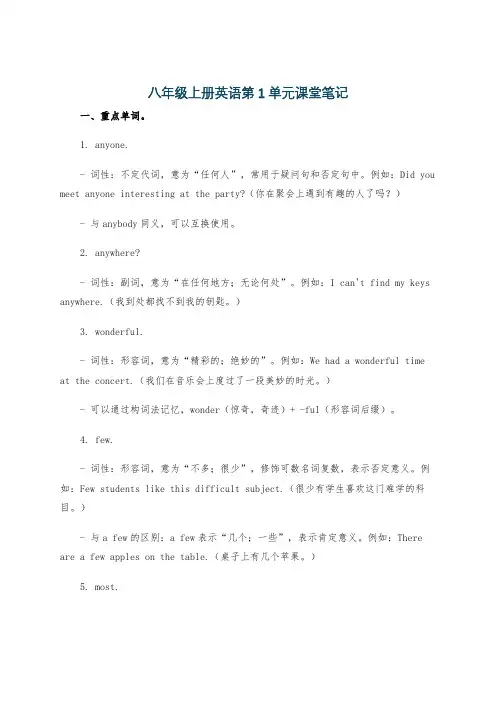
八年级上册英语第1单元课堂笔记一、重点单词。
1. anyone.- 词性:不定代词,意为“任何人”,常用于疑问句和否定句中。
例如:Did you meet anyone interesting at the party?(你在聚会上遇到有趣的人了吗?)- 与anybody同义,可以互换使用。
2. anywhere?- 词性:副词,意为“在任何地方;无论何处”。
例如:I can't find my keys anywhere.(我到处都找不到我的钥匙。
)3. wonderful.- 词性:形容词,意为“精彩的;绝妙的”。
例如:We had a wonderful time at the concert.(我们在音乐会上度过了一段美妙的时光。
)- 可以通过构词法记忆,wonder(惊奇,奇迹)+ -ful(形容词后缀)。
4. few.- 词性:形容词,意为“不多;很少”,修饰可数名词复数,表示否定意义。
例如:Few students like this difficult subject.(很少有学生喜欢这门难学的科目。
)- 与a few的区别:a few表示“几个;一些”,表示肯定意义。
例如:There are a few apples on the table.(桌子上有几个苹果。
)5. most.- 词性:形容词,意为“最多的;大多数的”;也可作名词,意为“大部分;大多数”。
例如:Most students in our class like English.(我们班大多数学生喜欢英语。
)- 作形容词时,可用于构成形容词的最高级形式,如:the most beautiful(最美丽的)。
6. something.- 词性:不定代词,意为“某事;某物”,常用于肯定句中。
例如:I have something important to tell you.(我有重要的事情要告诉你。
)- 与anything的区别:anything用于疑问句和否定句中,但在表示请求、建议或希望得到肯定回答的疑问句中也可用something。
八年级上册外研版英语书笔记
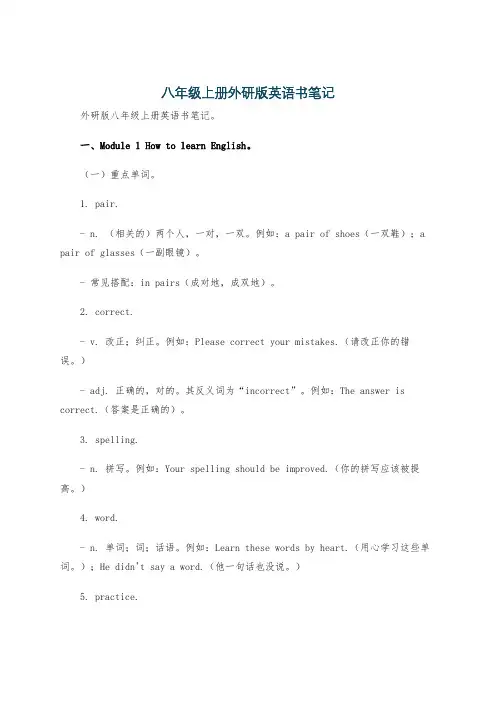
八年级上册外研版英语书笔记外研版八年级上册英语书笔记。
一、Module 1 How to learn English。
(一)重点单词。
1. pair.- n. (相关的)两个人,一对,一双。
例如:a pair of shoes(一双鞋);a pair of glasses(一副眼镜)。
- 常见搭配:in pairs(成对地,成双地)。
2. correct.- v. 改正;纠正。
例如:Please correct your mistakes.(请改正你的错误。
)- adj. 正确的,对的。
其反义词为“incorrect”。
例如:The answer is correct.(答案是正确的)。
3. spelling.- n. 拼写。
例如:Your spelling should be improved.(你的拼写应该被提高。
)4. word.- n. 单词;词;话语。
例如:Learn these words by heart.(用心学习这些单词。
);He didn't say a word.(他一句话也没说。
)5. practice.- n. 练习。
是不可数名词。
例如:We need more practice.(我们需要更多的练习。
)- v. 练习,后接名词、代词或动名词。
例如:practice speaking English(练习说英语)。
(二)重点短语。
1. look up.- 查;查找。
例如:Look up the new words in the dictionary.(在字典里查找新单词。
)2. make a mistake/make mistakes.- 犯错误。
例如:Don't be afraid of making mistakes.(不要害怕犯错误。
)3. write down.- 写下;记下。
例如:Write down your name and address.(写下你的名字和地址。
八年级英语(全年)课堂教学笔记
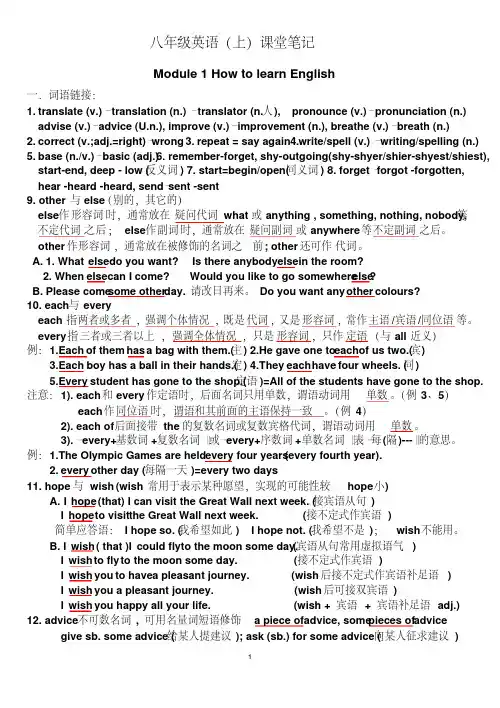
八年级英语(上)课堂笔记Module 1 How to learn English一.词语链接:1. translate (v.) – translation (n.) – translator (n.人), pronounce (v.) – pronunciation (n.) advise (v.) – advice (U.n.), improve (v.) – improvement (n.), breathe (v.) – breath (n.)2. correct (v.;adj.=right)–wrong3. repeat = say again4.write/spell (v.) – writing/spelling (n.)5. base (n./v.) – basic (adj.)6. remember-forget, shy-outgoing(shy-shyer/shier-shyest/shiest), start-end, deep - low (反义词)7. start=begin/open(同义词)8. forget –forgot -forgotten, hear -heard -heard, send –sent -sent9. other 与else(别的,其它的)else作形容词时,通常放在疑问代词what或anything , something, nothing, nobody,等不定代词之后;else作副词时,通常放在疑问副词或anywhere等不定副词之后。
other作形容词,通常放在被修饰的名词之前; other还可作代词。
A. 1. What else do you want? Is there anybody e lse in the room?2. When else can I come? Would you like to go somewhere else?B. Please come some other day. 请改日再来。
八年级上册英语笔记1~10单元
八年级上册英语笔记(1 - 10 单元)一、Unit 1 Where did you go on vacation?(一)重点词汇1.anyone /ˈeniwʌn/ 任何人-解析:用于疑问句和否定句中,表示“任何人”。
-例句:Did anyone see my keys?(有人看到我的钥匙了吗?)2.wonderful /ˈwʌndəfl/ 精彩的;极好的-解析:形容事物非常好,令人愉悦。
-例句:We had a wonderful time on vacation.(我们在假期里过得非常愉快。
)3.few /fjuː/ 很少;几乎没有-解析:修饰可数名词,表示数量少。
-例句:There are few people in the park today.(今天公园里人很少。
)4.quite a few 相当多;不少-解析:强调数量比较多。
-例句:I took quite a few photos on my trip.(我在旅行中拍了不少照片。
)5.most /məʊst/ 大多数;大部分-解析:可作形容词、名词或副词。
-例句:Most people like to travel.(大多数人喜欢旅行。
)(二)重点句型1.Where did you go on vacation? 你去哪里度假了?-解析:这是一个特殊疑问句,询问过去的动作。
-例句:Where did you go last weekend?(你上周末去哪里了?)2.Did you go anywhere interesting? 你去了什么有趣的地方吗?-解析:一般疑问句,用“Did + 主语+ 动词原形”的结构。
-例句:Did you do anything special yesterday?(你昨天做了什么特别的事情吗?)3.I went to the mountains. 我去了山区。
-解析:简单的陈述句,表达过去的动作。
八年级上册英语第五单元课堂笔记
八年级上册英语第五单元课堂笔记一、重点单词。
1. sitcom (n.) 情景喜剧(situation comedy的缩写)- 例句:My favorite TV show is a sitcom.2. news (n.) 新闻;消息。
- 不可数名词,常见搭配:a piece of news一则新闻。
- 例句:There is some important news today.3. soap opera 肥皂剧。
- 例句:She likes watching soap operas.4. mind (v.) 介意;对(某事)烦恼。
- 常见用法:mind doing sth. 介意做某事。
- 例句:Would you mind opening the window?5. stand (v.) 忍受;站立。
- 例句:I can't stand the noise.6. educational (adj.) 教育的;有教育意义的。
- 例句:This documentary is very educational.7. plan (n. & v.) 计划;打算。
- 名词用法:make a plan制定计划。
- 动词用法:plan to do sth. 计划做某事。
- 例句:I plan to visit my grandparents this weekend.8. hope (v. & n.) 希望。
- 动词用法:hope to do sth. 希望做某事。
- 例句:I hope to be a doctor in the future.- hope后不能接sb. to do sth.这种形式。
9. find out 查明;弄清。
- 区别于find(找到,强调结果),find out更强调经过调查、研究等查明事情的真相。
- 例句:Can you find out when the train leaves?10. discussion (n.) 讨论;商量。
八年级上册英语课堂笔记
八年级上册课堂笔记(1-6单元)Unit 1 Where did you go on vacation1,一般过去时基本结构:主语+动词过去式+其他;否定形式:①was / were + not; ②在行为动词前加didn't,同时还原动词;一般疑问句:①Was/Were+主语+其他②Did+主语+动词原形+其他2,动词过去式规则变化:直接加ed;以不发音e结尾的单词,直接加d;以辅音字母+y结尾的,变y为i加ed;以元音字母+y结尾的,直接加ed;以重读闭音节结尾的,双写最后的辅音字母+ed不规则变化的动词过去式(见书本最后一页)3,go on vacation去度假 be on vacation在度假4,anyone任何人,只用于指人,一般用在否定句、疑问句中,后面不接of 短语。
做主语时位于动词用单数。
Eg:Is there anyone at homeany one任何一个,指人或物,后面接of 短语。
Eg:You can take any one of these books. 5,adj修饰不定代词后置 anything special something importantenough作adv,修饰adj/ adv 后置 old enough fast enoughelse作adj,修饰疑问代词和不定代词后置 what else who else something else 6,quite a few/ little 相当多7,How/ what about+V-ing/ n/ 代词…怎么样(表建议、询问)8,most students= most of the students“one of +the most +adj +n复数”表示“最…之一”Eg:He is one of the most famous writers in China.A most +adj +n 非常 Eg:Hangzhou is a most beautiful city.9,buy/ get sb sth= buy/ get sth for sb10,what do you think of/ about…= how do you like…你认为…怎么样11,have fun,enjoy oneself,have a good/ great/ wonderful time+V-ing,12,主语+ seem+(to be)+表语(n/adj) eg:Tom seems to be a smart boy/ happy.It seems that从句 eg:It seems that he understand.主语+ seem to do sth eg:He seems to understand.13,adj 以-ing结尾“令人…的”exciting,interesting,relaxing,boring 以-ed结尾“人感到…的”excited,interested,relaxed,bored14,询问价格:How much is… What’s the price of…表示价格高低:…be expensive/ cheapThe price of … is high/ low15,get to, arrive in/at, reach,到达(如果后面接地点的副词home,here或there ,就不用介词in ,at, to)16,decide(not)to dodecide that从句decide+疑问词+不定式17,try(not)to do sth尽力try doing sth 尝试try/ do one’s best to do sthtry it on试穿(动副结构) try out试验 have a try试一试18,feel like感觉像 feel like doing sth/ want to do sth/ would like to do sth19,a lot of= lots of =plenty of20,in the past在过去21,enjoy/ like doing22,感叹句:How+adj+主谓!How+adj+a/an +n单+主谓!What+ a/an +adj+ n单+主谓!What+ adj+ n复/ 不可数+主谓!23,more than=over超过 less than 少于 more or less或多或少24,wait for等待25,too many“太多”修饰可数名词复数too much“太多”修饰不可数名词much too“实在太”修饰形容词或副词26,because+从句 because of +n/ V-ing /代词27,enough作adj修饰n, enough time enough moneyhave enough…to do sth eg:I have enough time to finish the work. enough作adv修饰adj/ adv old enough fast enough…enough for sb to do sth eg:The job is easy enough for me to do. not…enough to do The book isn’t easy enough for me to read.too…to… The book is too difficult for me to read.so…that… The book is so difficult that I can’t read.28,the next day第二天29,remember/ forget+to do要做+doing做过30,Stop sb from doing sth阻止Stop to do 停下来去做其他事Stop doing 停止正在做的事31,another two hours=two more hours32,at the top of在…顶端,名列…之前强调点on the top of在…上面强调面33,find out查明,弄清 find找到(结果) look for寻找(过程)34,go on with/ doing sth继续原来的事go on to do sth继续做别的事35,so +adj +that +结果状语从句“如此……以致……”eg:I was so busy that I didn’t go to sleep for 3 days.so that 引导目的状语从句,以便,为了(in order to)eg:they got up early so that they could catch the early bus.so +adj +(a/ an+n单数)that It is so important a meeting that I can’t miss it.such+ a/ an+ adj + n单数+that It is such an important meeting that I can’t miss it.such+ adj+n复数/不可数+thatUnit 2 How often do you exercise1,How 如何(方式)how long 多长(时间)答语常用“(For/ about +)时间段”how far多远(距离)答语常用“(It’s +)数词 +miles/ meters/ kilometers”how often多久一次(频率)答语常用“Always/ often/ every day/…”或“次数+时间”等表频率的状语How soon多快,多久以后,常用在将来时中。
人教新目标英语八年级上册Unit3单元课堂笔记
人教新目标英语八年级上册Unit3 I’m more outgoing than my sister课堂笔记1. 事实上;实际上 in fact2. 唱歌比赛 the singingcompetition3. 头发更短的那个 the one with shorter hair4. 真正关心我 truly care about me5. 只要;既然…as long as… (像…一样长)6. 一…就… … as soon as… ( 尽快…)7. 分享一切 share everything 8. 与…不同 /有差异 be different from9.与…一致/相同be the same as… 10. 与… 相似的/类似的 be similar to…11.摔断胳膊 break the arm 12. 小学 primary school13.打电话询问更多信息 call for more information 14. 取得更好的成绩 get better grades15. 形容词和副词的比较级一、含义1. 大多数形容词和副词有三个等级:原级、比较级、最高级: good – better - best2. 比较级:表示两者(人或物)之间的比较。
3. 加more/most ~的情况:部分双音节和多音节词4. 双写的词:一个大热天,一个胖子和一个瘦子穿着红衣服,汗湿了,很伤心。
big hot fat thin red wet sad二.比较级基本句型:↗连系动词+ adj.(比)如: Lucy is slower than Lily.1.主语+谓语动词+adj./adv(比)+ than+ 对比成分↘实义动词+ adv./ (比)如:Lucy runs more slowly than Lily.2. 主语必须与对比成分保持一致:Her hair is longer than yours.(→your hair)3adj./adv.(原级)+as …: “如同…一样…”not as/so+adj./adv.(原级)+as …: “不如……一样……”4.比较级+and+比较级:越来越…… e.g. They talked more and more loudly.5. The比较级…,the+比较级…:越…就越… The more exercise you do, the stronger you’ll be.6. “Which / Who is + 比较级, A or B?” e.g. Which T-shirt is nicer, this one or that one?7. the+比较级+of the( two ) : 两者中较…的一个Of the twins, she was the more hard-working .8. 常用the one代单数可数名词,the ones /those 代替复数名词,that 代替不可数名词.e.g. The book here is newer than the one on the desk.The apples on the tree are fresher than those/the ones in the box.The weather in Wuhan is hotter than that in Beijing.9. 比较级前可用“数词+名词” 表示确定的度量。
- 1、下载文档前请自行甄别文档内容的完整性,平台不提供额外的编辑、内容补充、找答案等附加服务。
- 2、"仅部分预览"的文档,不可在线预览部分如存在完整性等问题,可反馈申请退款(可完整预览的文档不适用该条件!)。
- 3、如文档侵犯您的权益,请联系客服反馈,我们会尽快为您处理(人工客服工作时间:9:00-18:30)。
I can't wait to see her.
get off 下车
等车停下来了再下车。 Do not get off the bus until it stops. get on/off the bus get into/ out of the car get on/ off it
6、interest 1) 名词,令人感兴趣的事或人;兴趣,爱 好。places of interest表示“名胜,景点”。 游与集邮都是他的爱好。
We invited him to our house for a drink. 他邀请我今晚去喝咖啡。
He invited me to have coffee tonight.
3. join 参加,加入,指加入某一种组织政体,党派,团 体,人群等,成为其中一员,后接名词或代词 become a member of. 而 join in=take part in,意为参加某种活动。 我哥哥去年入了党。
My brother___________ the Party last year. 我上周参加了校运动会。
Last week, I ________ __________ the school sports meeting. join the club; join our school trip; join the army/ Party; join us join in the football match take part in our game/ activities…
的”,表示事物本身; interested作形容词,常用于sb. is interested in sth. 结构,意为“某人对……感兴趣”。 我对历史很感兴趣。
I’m very interested in history. 我们就不能做点更有趣的事情吗?
Can’t we do something more interesting? I am not interested in playing computer games. I have no interest in playing computer games.
5. All of us couldn’t wait to get off the bus. can’t wait to do sth. 迫不及待地做某事 can’t wait for sth.
我迫不及待地想了解考试结果。 I can't wait to learn the result of the exam. 我急于去看她。
7. Go and see for yourselves! for oneself 为了自己,亲自 by oneself 独自地,独立地=alone
你不能只为了自己而活着。 You shouldn’t live just for yourself.
我独自一个人做了这件事。 I did it by myself.
2. Yesterday Kitty’s teacher Mr. Wu invited me to join their school trip to the World Park.
invite v. 邀请 invite sb. to do sth. 邀请某人做某事 invite sb. to some place 邀请某人去某地 我们邀请他到我们家喝酒。
Both swimming and stamp collecting are his
interests (hobbies). 上个月,父亲带我去了江苏的许多名 胜。
Last month, my father took me to many
places of interest in Jiangsu.
interesting作形容词,意为“有趣的,引起兴趣
4. We finally arrived at the park.
arrive表示“到达某地”时,后面要接 介词,到达大地点用in;小地点多用at。
我们到了巴黎。 We arrived in Paris. 我们到了车站。 We arrived at the station. get to sp; arrive at/ in sp; reach sp get here/ there/home; arrive here/ there/ home; 昨晚你什么时候到的? When did you arrive yesterday evening? reach后要加地点
